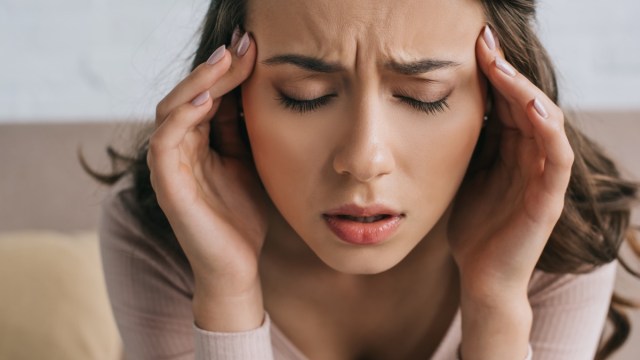Have you ever wondered why after having a delicious lunch or dinner, you’re suddenly hit with an intense headache when you’re full? You find yourself holding your head and closing your eyes as you can feel your head pounding, throbbing so hard you feel like banging it against the wall just to have some sort of relief?
Why do you get headaches right after eating, by the way? The health experts reveal the reason behind your headaches and what you can do to treat it.
TOO MUCH SUGAR
BREAKING: Shed 42 lbs In 30 Days With This Simple Night-time Pill
According to health experts, one of the culprits behind your headache after having a meal is sugar. The sugar you eat from eating rice and sweets like cookies, candies, or ice cream as your dessert makes you feel bloated and sluggish. Medhat Mikhael, M.D, at Memorial Care Orange Coast Medical Center says the sugar causes your blood sugar levels to spike up and drop quickly.
These sudden changes could result in a reactive hypoglycemia or also known as the post-meal low blood sugar (due to the quick spike and drop). This causes you to feel dizzy and lightheaded. Aside from that, you might also feel weak, a little shaky, and sweaty according to Mayo Clinic. To prevent this from happening, you need to eat sugar in moderation and be observant of your body. If you feel like an impending headache is coming, that’s your cue to stop eating sweets.
YOU ATE A TRIGGER FOOD
Most processed foods and drinks like cheeses, fancy charcuterie, and your favorite red wine all contain tyramine. This is an amino acid that triggers a migraine and headaches in people prone to them.
Aside from that, the health experts recommend you limit eating processed foods filled with chemicals and preservatives like nitrates, sulfites, and MSG since they increase the blood flow to the brain. These preservatives are often found in processed meats, alcohol, canned soup, and soy sauce according to the National Headache Foundation.
TOO MUCH SALT
If you don’t have a sweet tooth, then the health experts suspect you might be a salt food lover. Eating foods rich in salts like frozen foods, pasta sauces, fries, tomato juice, and other processed foods can trigger a painful throbbing in your head.
According to British Findings, most people who consume more sodium (around 8,000 mg per day) are more prone to headaches by 33% compared to those who only consume half that amount of sodium per day.
Meanwhile, the American Heart Association recommends consuming no more than 1,500 mg of salt every day for optimal health. They add that excess sodium causes your blood volume to thicken, eating up more space in your blood vessels.
Likewise, the blood vessels will expand to accommodate your blood. The sudden expansion triggers your headache. Aside from that, excess sodium causes your body to hold water – also known as water weight.
YOU HURT YOUR JAW
If you tend to eat crunchy or chewy foods and you noticed how your head throbs while eating it, then you might have a myofascial pain disorder (MPD). MPD is a type of pain of the muscles triggered when you move your jaw by eating, clenching, or straining hard according to Daria Hamrah, D.M.D., The strain can also lead to an achy head. To alleviate a headache, you feel, the health experts recommend you apply ice on your jaw to reduce the strain while taking an anti-inflammatory pain medication.
If the symptoms persist, you can have it checked with your dentist. The health experts also say you can trigger MPD if you clench your jaw during sleep. But this can be remedied by wearing a night guard to keep your clenching at bay according to Hamrah.
YOU HAVE FOOD INTOLERANCE
TRENDING: This Keeps Your Blood Sugar Below 100 - Even When You're Eating Sweets!
Do you have food intolerance for dairy or gluten? If so, the health experts say you might’ve eaten a trigger food that triggers your food intolerance. According to studies, people with celiac disease suffer migraines when they eat even a tiny bit of food containing gluten. The symptoms also vary depending on experience and tolerance.









